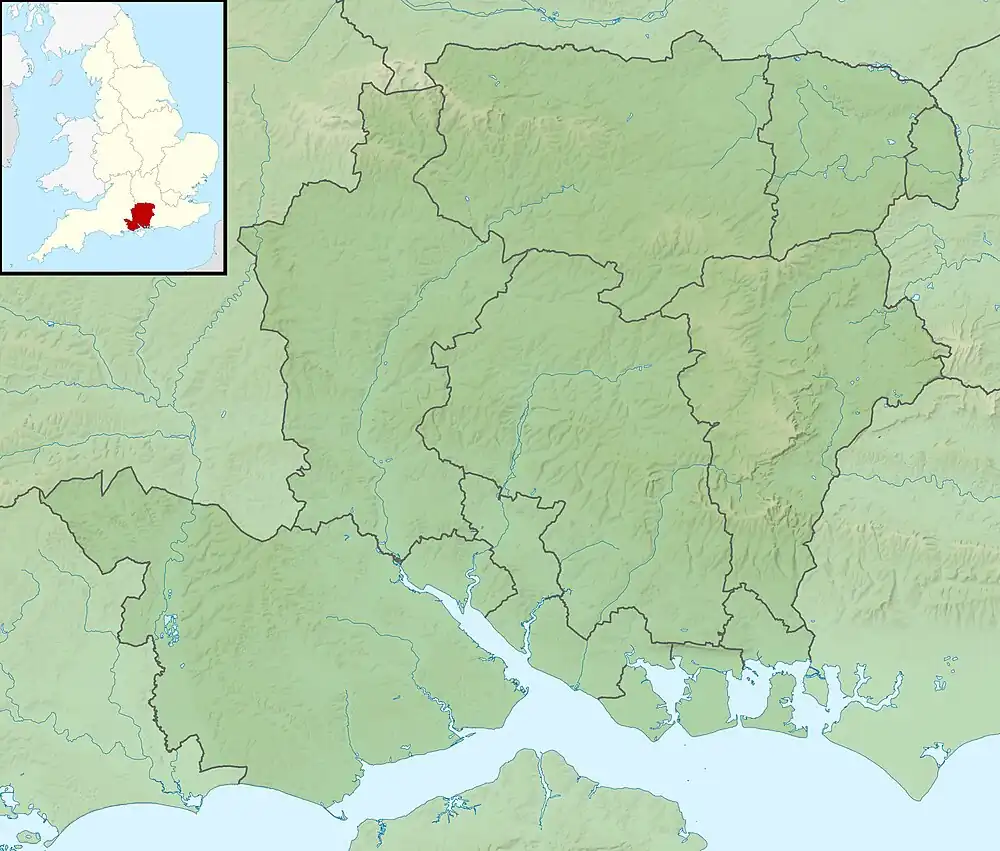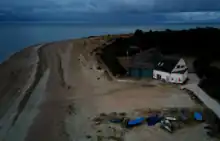| Hayling Island Lifeboat Station | |
|---|---|
 | |
 Hayling Island Lifeboat Station. | |
 Location of Hayling Island Lifeboat station within Hampshire | |
| General information | |
| Type | RNLI Lifeboat Station |
| Location | Hayling Island Lifeboat Station, Bracklesham Road, Hayling Island, PO11 9SJ |
| Country | England |
| Coordinates | 50°46′53.9″N 0°56′12.3″W / 50.781639°N 0.936750°W |
| Owner | Royal National Lifeboat Institution (RNLI) |
Hayling Island Lifeboat Station is a Royal National Lifeboat Institution station[1][2] located on Hayling Island close to the town of Mengham in the English county of Hampshire.[3] The station is located on the eastern side of Hayling island at the entrance to Chichester Harbour where it joins the major shipping route of the Solent, and is opposite the village of West Wittering. This major shipping route is busy at all times of the year and there are estimated to be 10,000[1] boats in the Chichester area alone. The Hayling Island station provides cover for the area 24 hours a day, all year, by means of two inshore rigid inflatable lifeboats placed on this station.[1]
History

1865–1924: original station

The Royal National Lifeboat Institution (RNLI) first opened a lifeboat station on Hayling Island in 1865 after a pair of marine incidents in 1862 and 1865 made it clear that regular lifeboat coverage was required at Hayling. In each incident, local fishermen had been required to step in and rescue the crews of wrecked vessels, despite lacking proper lifesaving equipment and training.[4] In February 1865, a location was found for a boathouse and an order placed for a self-righting lifeboat for Hayling.[5] The station was officially opened on 13 September 1865 with the naming of the new lifeboat called RNLB Olive Leaf, was blessed by the Bishop of Chichester Ashurst Gilbert. The first boathouse was built at a cost of cost of £259 10s 0d and was used until 1913. The original structure is still standing, although not in its original form: it has been incorporated into a structure used as a public house and restaurant.[6]
In 1888, Hayling received the Charlie and Adrian (ON 146), a self-righting lifeboat, which remained on station until 1914.[7]
In 1914 a new lifeboat, the Rubie-class Proctor (ON 640), was allocated to Hayling.[7] As she was larger than the previous two lifeboats, a new boathouse was required. The new boathouse was built two miles to the east of the original, at a cost of £900.[7]
The original all-weather lifeboat service at Hayling island operated for a total of 59 years until closure on 15 May 1924. The RNLI decided to close the station as the neighbouring stations at Selsey[8] to the south-east, and Bembridge[9] to the south west on the Isle of Wight, both operated more modern and faster motor lifeboats which, by the 1920s, were deemed to be more effective given the shipping patterns and the type of vessels now operating in the Solent. The 1914 boathouse still stands on the seafront and today is used by the Army cadets.[10]
1966–1980: private lifeboat station and re-opening
By the 1950s, increased use of pleasure craft along the Hayling coastline had led to a corresponding increase in marine incidents which required lifeboat services. In 1966, a local man and his two sons started an unofficial rescue service and patrol on the island, using an old RNLI inflatable to patrol the coast and provide faster local response times. The fledgling service was run from a caravan located next to the coastguard station. A Land Rover was used to launch the boat and the lifeboat was powered with a 40 hp Evinrude outboard motor. Their tiny organisation became part of the Shore Boat Rescue Scheme, an RNLI-recognised scheme.
This independent service formalised in 1971 as the Hayling Island Sea Rescue and Research Organisation (HISRrO), which launched for rescue services and undertook patrols along the area's coast and inland estuaries.[11] It also researched rescue procedures and methods for divers. In 1975 the HISRrO and the RNLI agreed to operate a joint service and in 1975 the partnership began operating from a new boathouse at Sandy Point. The RNLI placed an Atlantic 21 Inshore Life Boat (ILB) on station. The two organisations worked alongside each other until 1978, when they agreed to discontinue their joint association. Sole administration for the station and service was taken over by the RNLI. HISRrO continued to operate independently after the split until closing in August 1992.[12]
In 1980, launch facilities at the boathouse were improved with the installation of a launch ramp. In November 1980 the station also received a new Atlantic 21 inshore lifeboat, the first to be designed and built for the Hayling Island station.[7]
2004–present: hovercraft and new station

In June 2004 the RNLI sent a hovercraft, Hurley Spirit (H-005), for trials at Hayling island.

Work began on an extensive refurbishment of the station in late 2006 to allow the placement of a new lifeboat, its A85 Do-Do launch carriage, and a launch tractor. The operated out of shipping containers temporarily placed on the station's car park during the rebuild. The new station, which incorporated the old structure, was completed in November 2007 and included a new boat hall with an upper storey. The new station was paid for from legacies of £500,000 from the Lusty family and £300,000 provided by Gwendoline Prince and the Hudson family.[7]
_-_geograph.org.uk_-_1423408.jpg.webp)
The two current lifeboats are an Atlantic 85-class lifeboat and a D-class (IB1) lifeboat.[7] The Atlantic 85 inshore lifeboat is called Derrick Battle (B-829) and arrived on station on 26 February 2009. It is fitted with radar interlaced into the GPS system and VHF direction finding gear. The lifeboat is equipped with two 115 hp Yamaha outboard engines and has the capability of thirty five knots.[7] The second lifeboat is a smaller D-class inflatable lifeboat and is called Amanda, James and Ben (D-642).[13] It arrived on station in May 2005 and is an IB1 type boat powered by a 50 hp outboard engine giving her a top speed of twenty five knots.[7]
Fleet
All Weather Boats
| Dates in service | Class | ON | Op. No. | Name |
|---|---|---|---|---|
| 1865−1888 | Self-Righter, Pulling | Olive Leaf | ||
| 1888−1914 | Self-Righter, Pulling | ON 146 | Charlie and Adrian | |
| 1914−1924 | Rubie Self-Righter, Pulling | ON 640 | Proctor |
Inshore Lifeboats
B-class Lifeboats
| Dates in service | Class | Op. No. | Name |
|---|---|---|---|
| 1975–1980 | Atlantic 21-class | B-511 | Co-Operative No. 1 |
| 1980−1994 | Atlantic 21-class | B-548 | Aldershot |
| 1994−1995 | Atlantic 21-class | B-541 | Elizabeth Bestwick |
| 1995−1995 | Atlantic 21-class | B-526 | Un-named |
| 1995−2009 | Atlantic 75-class | B-712 | Betty Battle |
| 2009−present | Atlantic 85-class | B-829 | Derrick Battle |
D-class Lifeboats
| Dates in service | Class | Op. No. | Name |
|---|---|---|---|
| 1995–1996 | D-class (EA16) | D-398 | Victory Wheelers |
| 1996−2005 | D-class (EA16) | D-496 | Leonard Stedman |
| 2005−2015 | D-class (IB1) | D-642 | Amanda James and Ben |
| 2015−present | D-class (IB1) | D-779 | Jacob |
References
- 1 2 3 "Hayling Island Lifeboat Station". Hayling Lifeboats.org. Retrieved 10 January 2014.
- ↑ "Hayling Island Lifeboat Station". RNLI. Retrieved 12 January 2014.
- ↑ OS Explorer Map 120 – "Chichester, South Harting and Selsey". Southampton: Ordnance Survey. April 2009. ISBN 978-0-319-24079-3.
- ↑ Leach, Nicholas (1999). "Hayling Island". Part 2, South Coast of England – Eastbourne to Weston-super-Mare. For Those In Peril – The Lifeboat Service of the United Kingdom and the Republic of Ireland, Station by Station. Kettering: Silver Link Publishing Ltd. pp. 76–77. ISBN 1-85794-129-2.
- ↑ "Forrestt's Life-Boat Building Yard, Limehouse". Royal Museums Greenwich. 2014. Retrieved 11 February 2014.
- ↑ "Inn on the Beach". innonthebeach.co.uk. 2012. Retrieved 10 February 2014.
- 1 2 3 4 5 6 7 8 Leach, Nicholas (2010). Hayling Island Lifeboats. Foxglove Media. ISBN 978-0-95136-569-4.
- ↑ "Selsey Lifeboat Station". RNLI. 2014. Retrieved 12 February 2014.
- ↑ "Bembridge Lifeboat Station". RNLI. 2014. Retrieved 12 February 2014.
- ↑ "Hampshire and Isle of Wight ACF". Army Cadet Force. 2012. Retrieved 10 February 2014.
- ↑ "Hayling Island lifeboat station launches a book". The Hayling Site. OKO Digital. 10 May 2010. Archived from the original on 4 September 2014. Retrieved 17 February 2014.
- ↑ "Hayling Island Sea Rescue and Research Organisation – Removed charity". Charity Commission. Retrieved 17 February 2014.
- ↑ "D/IB1-class Production List (Up to D-599)". Navynuts.com. Retrieved 11 January 2014.